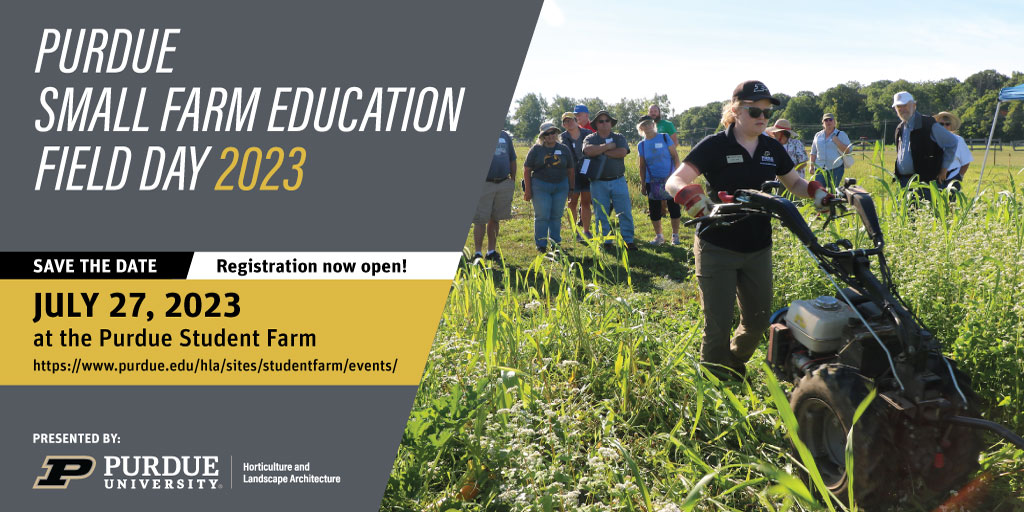The Purdue Small Farm Education Field Day is presented on July 27, 2023, at the Purdue Student Farm in West Lafayette, IN.
Registration for the field day is now open. To reserve your spot, visit https://cvent.me/ewWN3b.
Students register for free! Please get in touch with Lori Jolly-Brown to receive the discount code for student registration.
Educational topics for the 2023 field day include something for every grower.
High Tunnel Table Grape Production – Miranda Purcell
This study tests the feasibility of growing two table grape varieties (Mars and Canadice) under a high tunnel in Indiana. A similar study done by the University of Arkansas showed promising results, including significant yield increases, a reduction in disease pressure, and vines that come into bearing one to two years earlier than vines grown in the field. Results from this study will be used to determine if high tunnel table grape production is feasible in Indiana.
High Tunnel Pepper Production and Variety Selection – Petrus Langenhoven and Dennis Gustavo Toc Mo
Sweet pepper high tunnel variety trials have been conducted since 2018 at the Purdue Student Farm. Production techniques, variety selection, and variety performance will be discussed.
Growing Grains on the Small Farm – Dry Edible Bean Variety Trial – Wil Brown-Grimm and Ashley Adair
Heirloom varieties of many food-grade crops, including dry beans, may have a special niche on small and diversified farms in Indiana. Dry beans represent an opportunity to sell beans you don’t otherwise find at the grocery store. They also provide the farmer with more crop rotation flexibility as a relatively short-season crop. We are growing four heirloom varieties of dry edible beans in a trial at the Student Farm, as well as 2 additional varieties for demonstration. See these 6 dry edible bean varieties in action: Black Coco, Calypso, Jacob’s Cattle, Tiger’s Eye, Hidatsa Red Indian, and Lina Cisco’s Bird Egg. This demonstration will highlight some of the challenges and opportunities of dry edible bean production on a small scale.
Predator-prey dynamics in high tunnel crop production – Sam Willden
We will discuss the temporal variation in insect pests and natural enemies in high tunnel production systems and discuss the role that weeds play in relation to harboring potential pests or providing habitat for natural enemies. We will talk about how these dynamics change throughout the season and provide recommendations for pest management.
Biorational pesticide efficacy for controlling caterpillars and flea beetles in crucifer crop production – Laura Ingwell
Product selection, application and efficacy of control for caterpillar pests and flea beetles on cruciferous crops, with implications for other crop types, will be presented. The products being evaluated and discussed include bacterial, fungal pesticides, and plant-derived insecticides. We will discuss how their efficacy compares to the use of exclusion netting for pest management.
Black soldier fly composting and specialty crop production – Milena Agila and Laura Ingwell
Black soldier flies are native to the neotropics and migrate into Indiana each year. The larvae are economically important as they can be grown for food and feed on a variety of organic waste streams. Additionally, the digestate created from their feeding and the pupal cases remaining after adult emergence show promise as a soil amendment. This presentation will demonstrate the process of composting with black soldier flies. Specifically, we will discuss the various waste products that can be incorporated, the maintenance of moisture, and the potential benefits of harvesting both the flies and their digestate in the application of small farms.
Raised Garden Beds for Vegetable Production – Amy Thompson and Nathan Shoaf
Raised beds are commonly used by homeowners, backyard gardeners, and urban farmers if their soil type is not optimal. If soil is compacted with poor drainage, infested with pests, or if contaminants are present, installing raised beds can help improve vegetable production for your garden and may mitigate contaminant exposure. This talk will cover the advantages and challenges of growing in raised ground beds and supported raised beds, as well as considerations for site preparation, growing medium, and irrigation.
Postharvest food safety demonstration – Scott Monroe and Amanda Deering
Food safety is a necessary consideration in the production of fresh fruits and vegetables. During postharvest operations, due to the concentration of product, there is a potential for large portions of the crop to be contaminated with a human pathogen if food safety measures are not taken. Consequently, implementation of postharvest food safety measures is critical to the success of any on-farm food safety program. During this demonstration, members of the Safe Produce Indiana team will discuss and demonstrate postharvest good agricultural practices (GAPs). The packing room at the Student Farm will be used as a backdrop for this discussion. Topics will include washing, product flow, and storage of fresh fruits and vegetables.
Silage tarps and their potential uses on small farms – Steve Meyers and Josue Cerritos
In recent years, silage tarps have become a popular way for small farms to terminate cover crops, create stale seed beds, and facilitate more rapid and uniform germination of carrots. At this stop, we’ll discuss the possible uses of these tarps and demonstrate the ways they have been used on the Student Farm.
Choosing fertilizer injectors for drip irrigation for small plots – Wenjing Guan
Irrigation and nutrition are two essential parts of crop production. Combining nutrition and irrigation is a common practice in high-value specialty crop production. Injectors are the principal tools to apply water and nutrients directly to the root zone, readily for plant uptake. There are many types of injectors in the market. Understanding their usage in various scenarios may be overwhelming for beginning farmers. This demonstration aims to help small and beginning farmers choose desirable injectors for their systems and understand the pros and cons of the different injectors.
Contact Lori Jolly-Brown ljollybr@purdue.edu or Petrus Langenhoven plangenh@purdue.edu if you have any questions.
